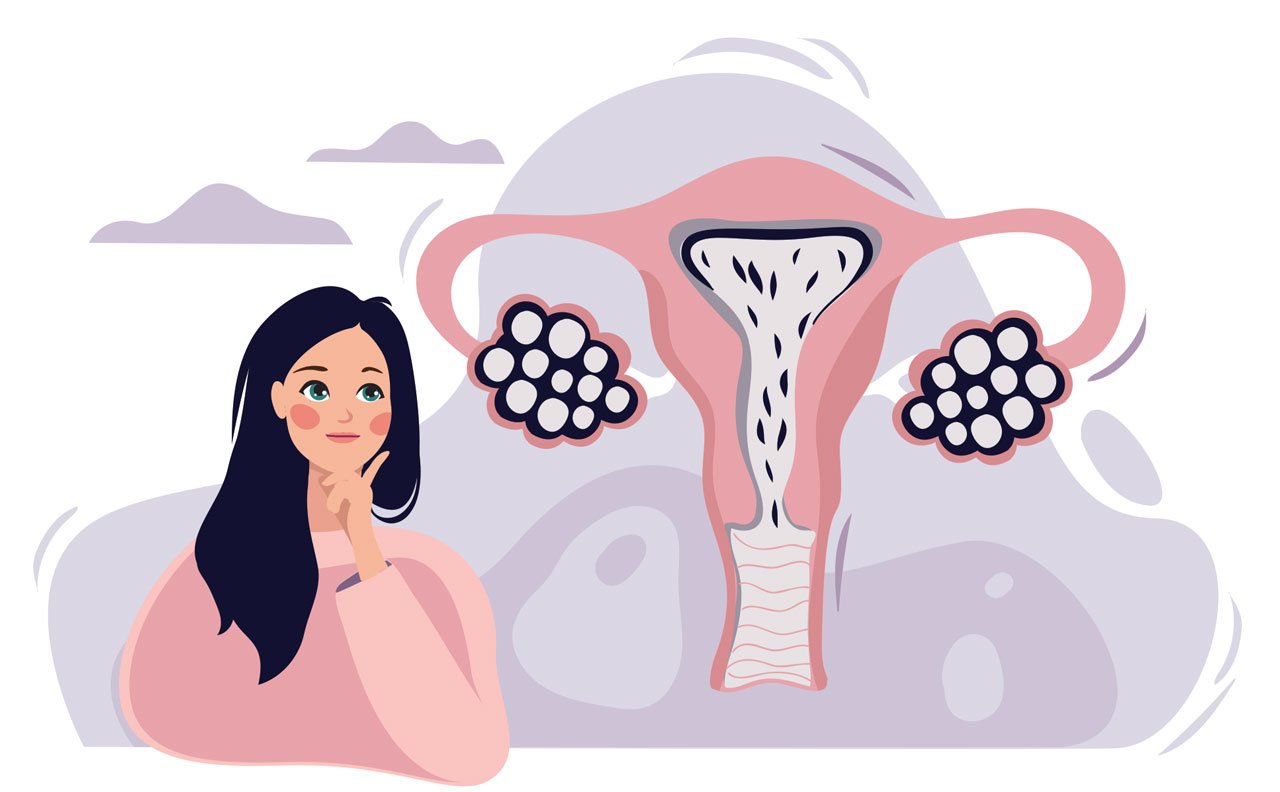Polycystic Ovarian Syndrome / PCOS

Polycystic ovarian syndrome/ PCOS is the one of the most common endocrine disorder which affects 10% women and girls of reproductive age, characterised by hyperandrogenism and insulin resistance. Androgen is a male sex hormone, normally female ovaries make a small amount of androgen. In PCOS ovaries start making slightly more androgen, this may cause irregular or no ovulation, acne and grow unwanted facial and body hairs.
Insulin is the other hormone which gets affected in PCOS. Insulin is responsible for maintaining blood glucose level within the range but in PCOS body has a problem using insulin, the condition is known as insulin resistance. Because of insulin resistance body doesn’t use insulin properly and blood glucose level rises. Also the chances of developing diabetes increases.
There are several sign and symptoms a woman can experience that’s why each woman may experience different symptoms.
Common symptoms are:
- Erratic menstrual periods
- Chronic anovulation resulting in multiple ovarian cysts
- Infertility
- Acne
- Hirsutism (unwanted facial and body hair)
- Weight gain and difficulty in losing weight
- Thinning hair on scalp
- Depression
- Acanthosis nigricans
- Obesity
Consequences of PCOS
- Impaired Glucose Tolerance – Approximately, 25% to 30% of women with PCOS will show impaired glucose tolerance by the age of 30.
- Type 2 Diabetes – 8% of women with PCOS will develop type 2 diabetes annually. Evidence demonstrates women with PCOS have 7 times higher chances to develop type 2 diabetes. Insulin resistance and centre obesity increases the chances of developing diabetes.
- Obesity – 60% of women with PCOS have chances to get affected by obesity.
- Cardiovascular diseases and hypertension – Women with PCOS have a higher risk of developing dyslipidaemia, higher LDL Cholesterol level and triglyceride levels. PCOS increases the chances of cardiovascular diseases and hypertension.
- Endometrial cancer – Several factors like obesity, long-term use of unopposed oestrogens, nulliparity (a state of women who has never borne a child), infertility, hypertension and diabetes increase the risk of endometrial carcinoma.
- Ovarian cancer – Ovarian cancer associated with PCOS is a debatable subject but infertility is associated with ovarian cancer. Women with PCOS have a strong history of infertility and exposure to certain medicines increases the risk of ovarian cancer.
- Breast cancer – Evidence say obesity, hyperandrogenism and infertility are known to be associated with the development of breast cancer, although there is no direct relation between PCOS and breast cancer but women with PCOS have set of symptoms mention above which increase the risk of developing breast cancer.
Tests
There is no single test which can diagnose PCOS, certain examination like physical assessment, medical history and assessment and ultrasound will help a doctor to confirm a woman is with PCOS or not.
Physical Assessment
- Weight
- BMI
- Changes in weight past 1 year
- Changes in thyroid gland appearance
- Skin and Hair
- Breast and belly
- Blood pressure
- Pelvic examination to find out if ovaries are enlarged or abnormal
Medical History
- Family history of diabetes or PCOS
- Family history of infertility
- Past history of pelvic injury
- Menstrual history
- Problem with getting pregnant
- Previous history of gestational diabetes
- History of Endometriosis
Medical assessments
Some tests of certain hormones are necessary to perform these are:
- Thyroid test (TSH)
- HCG test
- Testosterone
- Prolactin
- Cholesterol and triglycerides
- Glucose tolerance test
- CBC and liver function test
Ultrasound
- Pelvic ultrasound reflects ovaries actual condition and presence of cysts.
Treatments
- Treatments involve healthy eating’s, weight control and management and regular exercise.
- Regular exercise- walking is the best workout which anyone can do. Include vigorous exercises 3-4 times a week.
- Regular follow-up with concerning doctor and regularity in medicines and avoid self or over the counter medicines.
- Regular facial and hair care is required.
End Note: PCOS is not a disease, it has set of symptoms associated with hormonal imbalance. Hormones are known to perform certain functions within the body and secretion of other hormones. Imbalance in the secretion of one hormone alters the secretion of many other hormones which happens in PCOS. There are no certain treatments which could uproot the PCOS. Women with PCOS have to do changes in food habit and lifestyle to reduce the consequences associated with PCOS.
